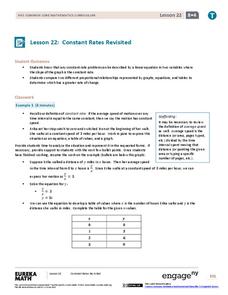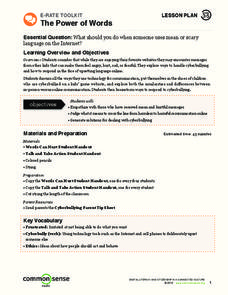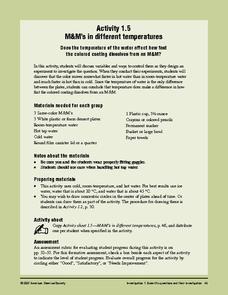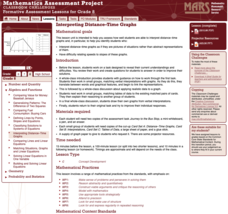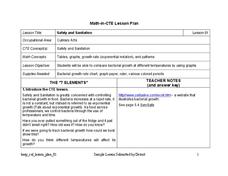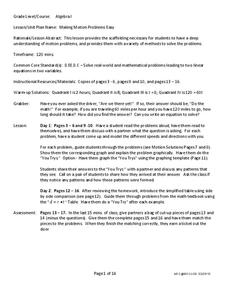Federal Reserve Bank
Market Basket SMART/ActivInspire Lesson Plan
Inflate your knowledge, not the economy! Pupils learn more about inflation with detailed worksheets and exciting activities such as role play, an interactive PowerPoint presentation, and a project in which they design a podcast on...
American Chemical Society
A Catalyst and the Rate of Reaction
More than 90 percent of chemical products are made using a catalyst. Lesson demonstrates the way a catalyst changes the rate of reaction without altering the chemical reaction. A catalyst doesn't appear as a reactant or a product, yet it...
Channel Islands Film
Island Rotation: Lesson Plan 3
How far have California's Channel islands moved? What was the rate of this movement? Class members first examine data that shows the age of the Hawaiian island chain and the average speed of the Pacific Plate. They then watch West of the...
Curated OER
Rates of Chemical Reactions-The Iodine Clock Reaction
Students investigate the reaction rate of iodine and soluble starch. In this rates of chemical reactions lesson plan, students study the effects of varying concentrations of reactants and varying temperatures of reactants on the reaction...
EngageNY
Constant Rates Revisited
Find the faster rate. The resource tasks the class to compare proportional relationships represented in different ways. Pupils find the slope of the proportional relationships to determine the constant rates. They then analyze the rates...
Curated OER
Dragonfly
The speed of a dragonfly brings math into the real world as your learners collaboratively see the value in calculating unit rates in direct proportion problems. This six-phase lesson encourages you, as the teacher, to only ask questions...
Curated OER
Human Body Series - Cardiovascular System
Pump up your class while studying the cardiovascular system with this pair of activities. In one, learners record heart rates during different actions. In the second, they read kid-friendly heart health articles online and then write a...
Baylor College
Heart and Lungs
With a partner, youngsters measure their pulse and breathing rates, both at rest and after running in place for a minute. While this activity is not novel, the lesson plan includes a large-scale classroom graphing activity and other...
Common Sense Media
The Power of Words
Give youngsters the tools to approach cyberbullying and hostile language on the Internet. This lesson plan includes a variety of handouts and worksheets that will prompt discussion and inquiry with your class members around harmful...
PLS 3rd Learning
Interpreting Heart Rates During Various Physical Activities
Learners review terminology: pulse, heart rate, target heart rate zone. They work in three groups, and assigned to one of three activity stations. At 5-minute intervals, 4th graders check their pulse and record it on their group card....
PwC Financial Literacy
Buying a Home: Terms of a Mortgage
Buying a home, dealing with a lender, securing a mortgage; these are daunting tasks for many adults. Why not teach middle schoolers about this area of adulthood so they are better-prepared to make the leap into home ownership when they...
Curated OER
Heart Rate
Learners move through a variety of locomotor skills at different paces to see how they affect their heart rate. In this health, human body, and physical activity lesson plan, students measure their heart rate and discuss health. A...
American Chemical Society
Temperature and the Rate of a Chemical Reaction
Putting glow sticks in the freezer makes them last longer, but why is that? Lesson focuses on how temperature impacts the rate of a chemical reaction. It begins with a teacher demonstration, then scholars design their own experiments...
American Chemical Society
M&M's in Different Temperatures
Help your class come up with a procedure for comparing the dissolving rates of colored candy coating in different temperatures of water. If you are placing importance on controlled variables with your class, make sure that they use equal...
Curated OER
Experiment on Measuring Reaction Rates
High schoolers investigate the rate of a chemical reaction. In this rate of reactions lesson plan, students use an electronic balance to measure the change in mass of a chemical reaction between hydrochloric acid and calcium carbonate....
Mathematics Assessment Project
Interpreting Distance–Time Graphs
Pre-algebra protégés critique a graph depicting Tom's trip to the bus stop. They work together to match descriptive cards to distance-time graph cards and data table cards, all of which are provided for you so you can make copies for...
EngageNY
Ratios of Fractions and Their Unit Rates 2
Remodeling projects require more than just a good design — they involve complex fractions, too. To determine whether a tiling project will fit within a given budget pupils calculate the square footage to determine the number of tiles...
National Research Center for Career and Technical Education
Safety and Sanitation
Your microbiologists explore the graphing of exponential growth functions using bacteria, like e. coli and salmonella, in a well-written, career and technology lesson.
Curated OER
Building Understanding of Rate of Change/Slopes Using Alice
Young scholars explore slope as a rate of change. In this eighth grade mathematics lesson, students investigate real-world problems to determine rate of change and transform it into a linear representation, thus determining slope. Young...
Federal Reserve Bank
It's Your Paycheck
Beyond reading and arithmetic, one of the most important skills for graduating seniors to have is fiscal literacy and responsibility. Start them on the right financial track with nine lessons that focus on a variety of important personal...
Curated OER
Money: Bucks, Banks, and Business
Put economics and currency exchange rates into a real-world application kids can understand. They'll compare bus fares from various cities around the world. Each child selects three international cities to research. They determine the...
University of Colorado
Distance = Rate x Time
Every year, the moon moves 3.8 cm farther from Earth. In the 11th part of 22, classes use the distance formula. They determine the distance to the moon based upon given data and then graph Galileo spacecraft data to determine its movement.
Bonneville
Design and Engineer Solutions
What's the best way to collect all that trash? A culminating activity has scholars use the knowledge and skills from the unit to design a solution to the plastic trash island problem. They use 3-D pens or a 3-D printer to build models of...
West Contra Costa Unified School District
Motion Problems
Let's hope class participants don't get motion sickness. In the lesson, class members first solve motion problems using tables and graphs. They then use algebraic techniques to solve motion problems.






